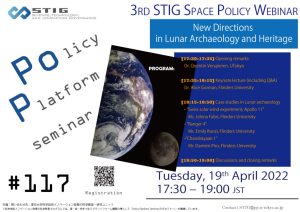【REPORT】As humans are preparing to go back to the moon, the topic of man-made objects that were left on its surface has become of interest. This is where the field of Lunar Archaeology and Heritage (a subset of the wider Space Archaeology field) is concerned. The Science, Technology and Innovation Governance (STIG) program held a webinar that introduced this emerging field of research on April 19, 2022.
First, Dr. Quentin Verspieren (The University of Tokyo) delivered opening remarks and introduced the STIG program and its activities. After that, he introduced the topic for this month’s webinar which is on New Directions in Lunar Archaeology and Heritage.
Following, Dr. Alice Gorman from the Flinders University delivered an opening keynote. She introduced “heritage” as things from the past that we want to preserve for present and future generations. Due to the previous lunar exploration missions, human heritage can be found in many different places on the moon.
After the keynote speech, Flinders University students Mr. Damien Piro, Ms. Jelena Fabri, and Ms. Emily Runzi introduced different case studies they made revolving around Lunar Archaeology. Mr. Damien Piro presented the Chandrayaan 1 which holds significance in India. The word “chandrayaan” is in Sanskrit which roughly translates to “mooncraft.” Ms. Jelena Fabri presented the Swiss Solar Wind Composition Experiment which was the only non-American experiment onboard Apollo 11. It was composed of a sail which was taken back to the Earth and a pole as its base which was left on the moon. This is the first flag that was put on a celestial body. Ms. Emily Runzi presented the Ranger 4 which was the first US spacecraft to successfully land on the far side of the moon. Its significance is that its technological capability at the time was far more advanced than any technology developed on Earth and it represents humanity’s growth during the time when lunar exploration has just started.
Finally, after the discussion and Q&A, Dr. Alice Gorman delivered the closing remarks. She pointed out that even if we focused on the moon in this webinar, humans have made the whole solar system a place rich in human history, culture, and heritage with all the man-made objects that are exploring the system.
Visit our STIG You Tube channel
【Background】
Building on success of the University of Tokyo International Symposium on the Future of Lunar and Cislunar Activities held on 21 February 2022, the STIG Program is holding a webinar on New Directions in Lunar Archaeology and Heritage with Dr Alice Gorman, Associate Professor at the College of Humanities, Arts and Social Sciences of Flinders University, an internationally recognised leader in the field of space archaeology, and exceptional students in space archaeology at Flinders University.
Date & Time:
Tuesday 19 April 2022, 17:30 – 19:00 JST
Venue:
Online (The Webinar access information will be sent to the registrants before the event)
Language:
English (no Japanese interpretation available)
Organizer:
Science, Technology and Innovation Governance (STIG) Program, Graduate School of Public Policy, The University of Tokyo.
Registration:
Please apply from the REGISTRATION FORM (https://forms.gle/UC5mwU1UNVmsUq6b7)
*If you cannot open the registration form, please email us at STIG@pp.u-tokyo.ac.jp, including your name and institution.
– Program –
[17:30-17:35] Opening remarks
Dr Quentin Verspieren, The University of Tokyo
[17:35-18:15] Keynote lecture (including Q&A)
Dr Alice Gorman, Flinders University
[18:15-18:50] Case studies in Lunar archaeology
• “Swiss solar wind experiment, Apollo 11”, Ms. Jelena Fabri, Flinders University
• “Ranger 4”, Ms. Emily Runzi, Flinders University
• “Chandrayaan 1”, Mr Damien Piro, Flinders University
[18:50-19:00] Discussions and closing remarks

Enlarge the flyer.
Contact:
Science, Technology, and Innovation Governance(STIG) Program
Graduate School of Public Policy, The University of Tokyo
STIG@pp.u-tokyo.ac.jp
04.19.2022